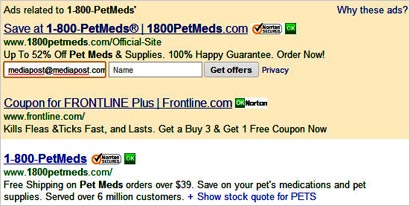Google Test Shows Paid-Search Ads, Email Marketing Integration
- by Laurie Sullivan @lauriesullivan, April 26, 2012

Email marketers may soon have an opportunity to tie campaigns into paid-search ads through a new ad format being tested by Google. It allows consumers who are searching for a specific brand to sign up for an email subscription and newsletter, or coupons and other information or offers -- all from the paid-search ad served up in query results.
The ad format includes a box that displays a user's Google email address when logged in to the service. A box next to the email address allows the user to enter in a product or brand. When the user chooses to click "Get offers" the email address gets sent to the advertiser.
Terry Van Horne, partner at Reliable-SEO, views the ad as a cost-per-action ad model, where the brand likely pays Google for each email address entered and submitted. The action is to collect the email address, he said -- calling it "a very sophisticated form of lead generation."
Google could also tie this to a user's Gmail account, so ads down the right rail might match coupons delivered in the email inbox.
The offer tested today with Gmail account users could eventually expand outside the network, allowing anyone who searches on google.com to enter any email address. For example, type in the keyword search box on google.com -- 1-800-petmeds. It will return an ad for the online retailer for those in the test area. Next to the email account box, users will find an entry box to type in a topic, such as "dog."
Van Horne did a search as a logged-out user of Google services and zero paid-search ads served up along with the 1-800-PetMeds query.
A Google spokesperson said tests have been running for several months. An earlier report citing the test points to a box reading "Subscribe to newsletter" rather than "Get offers." The switch in wording since tests began suggests tweaks to the service could point eventually to a tie in with Google Offers or other coupon services, rather than just newsletters.
For now, the tests are not related to Google Offers, but if Google decides to tie the ads into the coupon service it would likely require users to opt in, said Mike Marshall, aimClear search expert.


